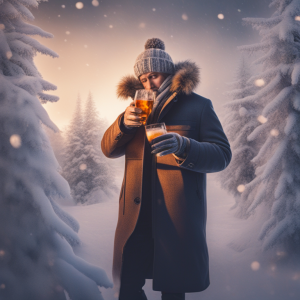Explore the Hidden Dangers of Drinking Alcohol in Frigid Winter Conditions
As we navigate the grueling challenges of winter, particularly in extremely cold climates, many individuals are drawn to the misleading warmth that alcohol seems to provide. However, it's essential to understand the severe risks associated with this behavior. This article delves into the critical dangers of consuming alcohol in icy environments, emphasizing why this practice is not only dangerous but also ineffective for maintaining essential body heat. By enhancing your awareness of these risks, you can make informed decisions that prioritize your safety and well-being throughout the perilous winter months, ensuring you remain resilient against the elements.
Before examining the associated dangers, it is important to dispel the pervasive myth that alcohol serves as a warming agent. The consumption of alcohol leads to dilation of blood vessels near the skin's surface, creating a false sense of warmth. While this feeling may provide temporary comfort, it neglects the body's critical need to maintain a stable internal temperature. In reality, alcohol’s effects can be harmful, diminishing your ability to endure cold conditions and significantly increasing the risk of severe health issues, such as hypothermia and other life-threatening complications.
 One of the foremost dangers of indulging in alcohol in freezing settings is the increased likelihood of dehydration. Alcohol acts as a diuretic, promoting increased urine production and resulting in significant fluid loss. Additionally, the frigid air typical of winter is often drier, leading to even greater moisture loss from our bodies. When these factors combine, they can create dangerously low hydration levels, which are vital for sustaining overall health and survival. Dehydration not only hampers physical capabilities but also detrimentally affects cognitive functions, impairing your ability to think clearly and make sound decisions during critical moments.
One of the foremost dangers of indulging in alcohol in freezing settings is the increased likelihood of dehydration. Alcohol acts as a diuretic, promoting increased urine production and resulting in significant fluid loss. Additionally, the frigid air typical of winter is often drier, leading to even greater moisture loss from our bodies. When these factors combine, they can create dangerously low hydration levels, which are vital for sustaining overall health and survival. Dehydration not only hampers physical capabilities but also detrimentally affects cognitive functions, impairing your ability to think clearly and make sound decisions during critical moments.
Understand How Alcohol Consumption Negatively Affects Decision-Making and Awareness in Cold Weather
Another major consequence of consuming alcohol is its detrimental effect on cognitive function and judgment. In survival situations, making clear and rational decisions is vital for ensuring personal safety. The presence of alcohol clouds judgment, making it increasingly difficult to respond appropriately to perilous situations. This impairment can lead to accidents and poor choices, which can be particularly catastrophic in extreme cold. Staying vigilant and aware of your surroundings is essential; however, alcohol undermines this necessity, amplifying the risk of errors that could endanger your well-being.
Moreover, alcohol disrupts the body's natural mechanisms for regulating temperature. Upon intake, alcohol causes blood vessels in the skin to expand, resulting in accelerated heat loss. While the initial sensation might be one of warmth, this ultimately leads to a rapid decrease in core body heat, a critical factor for survival. This creates a dangerous cycle wherein temporary warmth contributes to a swift decline in core temperature, heightening the risk of life-threatening conditions such as hypothermia. It's vital to recognize that while alcohol may provide a fleeting sense of comfort from the cold, it ultimately heightens vulnerability to severe cold-related health hazards.
Recognize the Alarming Connection Between Alcohol Use and Hypothermia Risks
When addressing the risk of hypothermia, it's crucial to understand how alcohol consumption can obscure the early warning signs of this dangerous condition. Hypothermia occurs when the body's core temperature drops below the normal range, generally below 95 degrees Fahrenheit (35 degrees Celsius). Initial symptoms include shivering, confusion, fatigue, and impaired coordination. However, alcohol depresses the body’s natural responses, making it more challenging to recognize these vital indicators. By the time hypothermia symptoms become apparent, it could be too late to prevent serious injury or even fatal consequences.
In winter survival situations, many safer and more effective alternatives exist to alcohol for maintaining warmth. Here are several key strategies that can significantly enhance your ability to stay warm and safe:
1. Dress in Layers for Maximum Insulation: Wearing multiple layers of clothing is critical for efficiently trapping warm air. Begin with thermal base layers, incorporate insulating mid-layers, and complete the ensemble with a windproof and waterproof outer layer to create a protective barrier against the biting cold.
2. Keep Your Clothing and Footwear Dry at All Costs: Moisture can lead to rapid loss of body heat, making it vital to keep your clothing and footwear dry. Choose waterproof materials and change into dry garments as needed to help retain warmth effectively.
3. Insulate Against the Cold Ground: Utilizing sleeping mats or insulation pads can drastically reduce heat loss, particularly during rest periods. This measure is essential for conserving body heat during extended durations in cold environments.
4. Opt for Warm, Non-Alcoholic Beverages: Rather than alcohol, consider indulging in hot drinks like tea, coffee, or hot chocolate. These beverages provide warmth without the negative side effects associated with alcohol consumption, ensuring you stay warm and alert.
5. Find or Build Shelter for Protection: Actively seeking or constructing a shelter can significantly minimize exposure to harsh winds and freezing temperatures. A well-designed shelter is vital for retaining body heat, greatly improving your chances of staying warm and safe.
6. Consume High-Calorie Foods for Sustained Energy: Eating nutrient-dense foods that are rich in calories can provide your body with the energy required to generate heat. Foods such as nuts and fatty fish are excellent sources of healthy fats that can be particularly beneficial in cold weather.
Understanding the dangers associated with alcohol consumption in freezing temperatures is essential for anyone involved in winter survival scenarios. Despite the fleeting feeling of warmth, alcohol can lead to dehydration, impaired judgment, disrupted temperature regulation, and can conceal the symptoms of hypothermia. By refraining from alcohol and adopting safe, effective strategies, we can significantly enhance our chances of surviving and thriving in extreme winter conditions. Stay alert, prepare thoroughly, and prioritize your safety above all else.
The post Hazards of Alcohol Consumption in Extreme Cold Conditions appeared first on Survival Bite.
The Article Alcohol Consumption Hazards in Extreme Cold Conditions Was Found On https://limitsofstrategy.com
The Article Alcohol Consumption Risks in Severe Cold Weather First Appeared ON
: https://ad4sc.com


This is such an important topic to address, especially as winter rolls in and many of us might be tempted to sip something warm to combat the chill. I remember a few years back, I went skiing with friends, and after a long day on the slopes, we celebrated with a few drinks at the lodge. At that moment, it felt great, but I realized later how misleading that warmth can be. The cold hit us harder once we stepped outside.